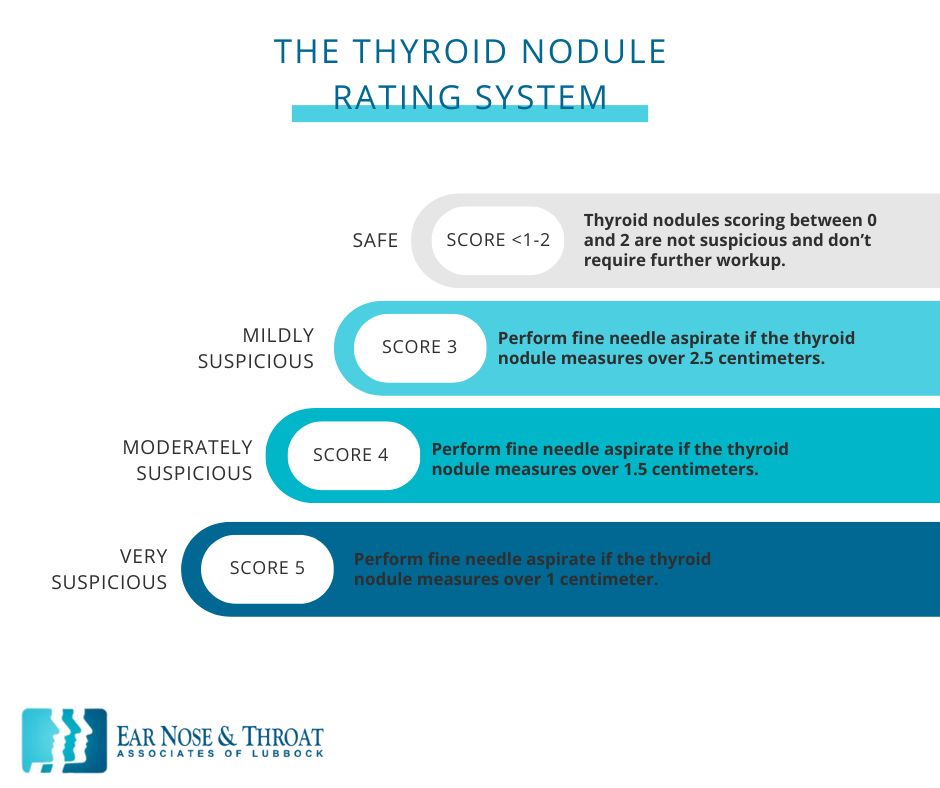When to Worry About Thyroid Nodules

Though thyroid nodules don’t make the news very often, they’re incredibly common.
According to the American Thyroid Association, half of all Americans will develop at least one thyroid nodule by the time they’re 60. The risk increases with age, so about 50% of 50-years-olds have a thyroid nodule, and 70% of 70-years-olds have one. Women are also four times more likely to develop thyroid nodules than men.
Fortunately, only about 5% of thyroid nodules are cancerous. But since they’re so prevalent, how do you know when to worry and when not to worry about thyroid nodules?
What Is the Thyroid?
The thyroid is a small, butterfly-shaped gland at the base of your neck, with a lobe sitting on either side of your windpipe. This little gland plays a big role in keeping major bodily functions running properly, including:
- Heart rate
- Metabolism
- Muscle and digestive function
- Brain development
- Energy levels
Since the thyroid plays such a significant role in our bodies, we have good reason to pay attention to its health and to developments like thyroid nodules. Nodules can indicate or coincide with conditions like:
- Hyperthyroidism
- Hypothyroidism
- Grave’s disease
- Iodine deficiency
- Hashimoto’s hypothyroidism
- Thyroid cancer
However, the presence of a thyroid nodule doesn’t necessarily mean you have one of these conditions. They can exist without causing any problems at all.
When Should I Worry About Thyroid Nodules?
Many thyroid nodules are so small that doctors can only detect them using ultrasound. Others are large enough to feel with your fingers when you palpate the area around your lower neck.
While these larger nodules are more worrisome than the tiny ones, size doesn’t necessarily reveal the nature of a thyroid nodule. For this reason, nodules of any size need medical evaluation.
Whether your doctor noticed your thyroid nodule or you discovered one yourself, any sort of unexpected growth is alarming and disconcerting. Let’s walk through the specific guidelines doctors use to help them decide when to worry about thyroid nodules.
The Thyroid Nodule Rating System
ENTs, endocrinologists, and radiologists use the TI-RADS, or the Thyroid Imaging Reporting and Data System, to rate the various traits of thyroid nodules. By measuring five characteristics (composition, echogenicity, shape, margin, and echogenic foci), the system ranks thyroid nodules on a suspicion scale of 0–5.
A score of 2 or below means you don’t need to worry about your thyroid nodule. A score of 3 or above means your doctor should perform followup testing in the form of a fine needle aspiration biopsy. You can see the full scale and its classifications below.
Score <1-2 = SAFE: Thyroid nodules scoring between 0 and 2 are not suspicious and don’t require further workup.
Score 3 = MILDLY SUSPICIOUS: Perform fine needle aspirate if the thyroid nodule measures over 2.5 centimeters.
Score 4 = MODERATELY SUSPICIOUS: Perform fine needle aspirate if the thyroid nodule measures over 1.5 centimeters.
Score 5 = VERY SUSPICIOUS: Perform fine needle aspirate if the thyroid nodule measures over 1 centimeter.
A nodule’s size in and of itself doesn’t mean it’s suspicious, but if it exhibits other characteristics on the TI-RADS scale, size becomes an important factor. Ultrasound imaging can help doctors identify your nodule’s characteristics, and the fine needle aspirate allows your doctor to remove a tiny sample of the suspicious nodule for examination under a microscope. This can reveal whether the nodule is cancerous or benign.

Treating Thyroid Nodules
In the 95% of cases where a thyroid nodule is benign, no treatment is necessary. Your doctor will continue to monitor the nodule over time. If it grows or becomes suspicious according to the TI-RADS calculator, your doctor can perform another biopsy to test for the development of thyroid cancer.
If a biopsy reveals a malignant nodule, you’ll likely need thyroid surgery to remove all cancerous cells.
In some cases, even benign thyroid nodules can cause worrisome symptoms. If a nodule grows too large, it can cause pain or interfere with breathing or swallowing, especially when the person lies down. In these cases, thyroid surgery may also be necessary.
The Bottom Line on When to Worry About Thyroid Nodules
Thyroid nodules are incredibly common, and doctors can’t (and don’t want to) simply remove everyone’s thyroid gland. This is why the medical community developed some very specific criteria to evaluate thyroid nodules both large and small and determine which need to be removed.
So if you discover a thyroid nodule, your best course of action is to visit an ENT, endocrinologist, or radiologist for a workup. Let them worry about your thyroid nodules for you. By visiting your doctor and getting evaluated, you’re doing everything in your power to take care of your health.
Dr. Scolaro is a board-certified Otolaryngologist servicing the South Plains area. He has been practicing in Lubbock since 1990 and has earned a reputation as a skilled and experienced surgeon. He currently serves as the Medical Director for Covenant High Plains Surgery Center campuses, is a member of Covenant Health Partners and is an adjunct faculty professor for Texas Tech University Health Sciences Center School of Medicine. Learn more about Dr. Scolaro.
Categories:








